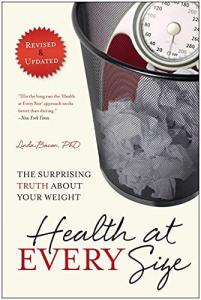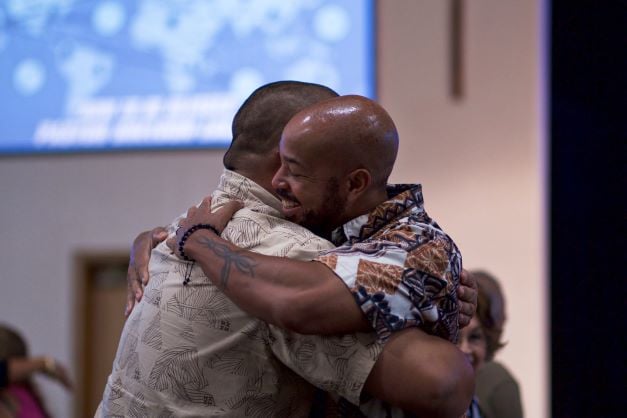Weight shaming and sizeism have no place in the church. It’s time to embrace all body types and celebrate the diversity of bodies in every shape and size.

It’s that time of year again when churchwide and denominational offices encourage their clergy and congregational leaders to “get healthy.” The start of a new year brings with it admonishments to lose weight, go to the gym, and “take better care of yourself.” While the intentions behind these exhortations are often based on a genuine desire for clergy to be healthy, they actually perpetuate one of the few remaining socially-acceptable stereotypes and prejudices: sizeism and weight shaming.
What is Sizeism and Weight Shaming?
Sizeism is prejudice or discrimination against people because of their size or weight. Weight shaming is disparaging, making fun of, or humiliating people because of the perception that they are either too fat or too thin. Also known as fat shaming and body shaming, weight shaming can lead to body dysmorphia, bullying, eating disorders, and depression.
To help educate and to end sizeism, the National Association for the Advancement of Fat Acceptance (NAAFA) argues that fatness is a form of body diversity that should be respected, much like diversity based on skin color or sexual orientation.
But don’t we have an obesity crisis in this country?
According to the Center for Disease Control, “Obesity is a common, serious, and costly chronic disease of adults and children” (https://www.cdc.gov/obesity/index.html). The terms “overweight” and “obese” are defined as “weight that is higher than what is considered healthy for a given height.”
How do health professionals determine who is overweight or obese? They use the Body Mass Index (BMI) as a screening tool. A person’s weight in kilograms is divided by the square of height in meters. An elevated BMI can indicate a high level of body fatness.
But who decided that BMI should be the screening tool? And how accurate is it?
Follow the money
I have to admit that until very recently, I was not aware of sizeism and that I was perpetuating weight shaming. A few years ago, my daughter encouraged me to read the book Body Respect: What Conventional Health Books Get Wrong, Leave Out, and Just Plain Fail to Understand About Weight. The book was co-written by Dr. Linda Bacon, a professor of health education, and Dr. Lucy Aphramor, a dietician and researcher. I initially approached the book with skepticism. But after reading it, considering the evidence, and engaging with ongoing discussions with people of all different body types, I have come to realize that my prejudice against fat people was real and really misinformed.

What I’ve learned is that the war on fat is incredibly lucrative for the pharmaceutical industry that both funds the “research” about obesity and profits enormously from the sale of weight-loss drugs. According to Body Respect, “the pharmaceutical industry, which has a vested interest in making us believe that fat is dangerous – and that they have the solution – wrote the BMI standards that are currently used” (15). In addition, the U.S. weight loss industry reached a record $78 billion in 2019 and is projected to grow globally by upwards of 8% over the next five years.
But these enormous profits come at the cost of heaping prejudice and unrealistic body standards both on those who are fat and those who fear becoming fat. According to Bacon and Aphramor, “there is very real evidence that fat people as a group are shouldering the brunt of the burden as they are denied equality in the job market, in health care, and in other areas of life, including basic dignity and representation in the media” (10).
Sizeism and weight shaming hurt clergy and congregations
Sizeism is used against clergy under the disguise of “concern” about health. For example, one of my teaching colleagues told me that she had a student who was denied a job at a church because the call committee thought she wasn’t going to live very long due to her obesity.
However, it’s a myth that fatness is responsible for disease. The problem is that we confuse correlation with causation. While it’s true that many diseases are more commonly found in heavier people, weight itself doesn’t cause disease. For example, people who are thin but unfit have higher death rates than people who are heavy but fit (Vaugh W. Barrya et al., “Fitness vs. Fatness on All-Cause Mortality: A Meta-Analysis,” Progress in Cardiovascular Diseases 56, no. 4 (2014): 382-90).
Nevertheless, clergy themselves will sometimes preach sizeism and engage in weight shaming against their own parishioners. Often framed as wanting to encourage good health, the sermon might reference a biblical passage such as 1 Corinthians 6:19-20:
Do you not know that your body is a temple of the Holy Spirit within you, which you have from God, and that you are not your own? For you were bought with a price; therefore glorify God in your body.
The preacher might point to obesity as defiling the temple of one’s body. This is based on problematic theology which can be harmful to children, teens, and adults. When one’s own body is labeled a “sin,” incredible suffering results.
Why weight shaming is bad theology
Dr. Emily Askew, professor emeritus of theology and my colleague at Lexington Theological Seminary, explained to me why weight shaming is bad theology.
“What we have learned from feminism, queer theology, and especially disability rights theologians is that the classical default for understanding what it means to be made in the image of God (imago Dei) has been a heterosexual, white European able-bodied physically fit, young male,” she said. “Every other form of human embodiment across theological history has been understood as a deviation from this notion of God’s ‘perfection.’”

Thus, any body that deviates from this distorted conception of the imago Dei is an affront to God and the church. This can result in a version works righteousness where “salvation” is achieved by attaining a more “perfect” body. In this warped theology, thinness is next to godliness.
A United Methodist clergyperson shared with me her experience with this kind of harmful theology. “I was at a conference a few years ago where the speaker talked about the unfaithfulness of pastors who were overweight. I had to walk out. There is absolutely no place for that in the church.”
When we equate body size with lack of faith, this creates an impossible situation, because every body is at risk of being judged overweight by anyone at any time.
“Thin” adolescents and adults can develop such a morbid fear of becoming fat that they become bulimic or anorexic. “Obese” children, teens, and adults suffer the constant messaging from society, friends, family, media, and the church that their bodies are not acceptable – not even to God.
“This has really become a war against people and bodies,” Bacon and Aphramor explain. “We are all victims in this obesity war – whether we are fat or fear becoming fat” (10).
Yet, as Dr. Askew points out, “social-justice movements have critiqued this clearly patriarchal, racist, ableist, homophobic understanding of being God’s good creation. This means we must now dispense with the shame and guilt we place on diverse body sizes as being not ‘of God.’”
How weight shaming hurts church leaders
I’ll share just two examples of ministry leaders who have experienced discrimination, bias, and intolerance for their body size. Their stories can give us insight as to how weight shaming not only hurts congregation leaders, but the whole church. (Their names are changed to protect confidentiality, but their stories are shared with permission.)
Nancy’s story
Nancy is a white female who is a deacon in her denomination. “I am a person who has struggled with weight my entire life,” she told me. “For many years it was not just the physical struggle, but the psychological struggle that plagued me the most.”
She has had issues with her hip and leg which most people attribute to her weight. But her weight is not the cause of her mobility issues. They are a result of genetics, giving birth, and having surgeries related to cancer, including a hysterectomy for which she was given no hormonal treatment. This led to the deterioration of her bones and problems with her hip. She also had three abdominal surgeries which make it especially difficult for her to lose weight due to scar tissue and weakened muscles.
Nancy often encounters people who make uninformed and false assumptions about the connection between her health and her weight. But she was shocked to be openly questioned about both in candidacy meetings.
“In one meeting I was asked how I could possibly love and care about myself when I was overweight. I was accused of not caring for my health and wellbeing,” she recalled.
A particularly biting comment came from a committee member who was also a seminary professor. “She tried to highlight the need for feminine empowerment and basically said that that I wasn’t empowering myself because of my weight. That really made me angry. I’m very progressive and a feminist. So for a female professor to say this to me was just awful.”
Being subjected to weight shaming by the people who were charged with determining her future career was extremely hurtful, she recalled. “Especially given that these were people of the church, a place where I had felt love and respect and believed that all were to be loved and embraced for who and what they are. To have people in the church shaming me was quite difficult and not helpful in the slightest.”
Fortunately, in recent years she has come to “a much brighter, empowering place of embracing who I am. I now know that if others have an issue with my weight, it’s their problem, not mine. I now have a mindset of body positivity.”

Russell’s story
Russell is a male clergyperson in his denomination. In addition to being a large man, he is also black, which leads to a double dose of discrimination. “Colleagues, church, and lay leaders seem to not think about the discrimination they inadvertently place on me and others who are large and BIPOC (black, Indigenous, and people of color). Many people have questioned my health even after I tell them that I visit my doctor four times a year and exercise several times a week. Some ask, ‘Oh, then why are you still so big?’”
Russell’s experience is one example of the ill-informed assumptions people make about health and body size. As Bacon and Aphramor point out, there are many other factors that influence self-care and health outcomes, including genes and biology, quality of medical care, and social determinates such as poverty, race and ethnicity, and job stress. For pastors such as Russell, these factors play a prominent role not only in his personal health but also his professional life.
As an additional stressor, white people tend to fear big, black men and other men of color. They are perceived not just as unhealthy but as threatening.
“I know I have been rejected from being considered for positions because of my size. Recently, when a call committee met me for the first time in person, one person said mockingly, ‘Oh, I thought you would be bigger.’”
Russell also notes that clergy with larger body sizes deal with systemic discrimination even in the realm of ecclesiastical arts. “Like other clothing businesses, many liturgical arts companies penalize people of size by charging more. They say it is due to the need for ‘more fabric’ used to make the garment. The added costs for those with bigger bodies can make the outfits unaffordable. Being a high church liturgist, this is a problem for me because I need this apparel for my job.”
It’s time to stop the theological malpractice of weight shaming
Weight shaming is a form of theological malpractice which must come to an end. We can counter this harmful theology with the positive theology of the incarnation, a doctrine of Christology that has profound implications for how we think about and treat bodies.
In her book, She: Five keys to Unlock the Power of Women in Ministry, Karoline Lewis explains, “When you imagine the doctrine of the incarnation not as a doctrine, per se, but as God’s commitment to the inherent vulnerability of humanity, the focus of God’s intention for humanity shifts exponentially. That is, an essential component of how we understand ministry in God’s church is intimately tied to God’s commitment to the entirety of what it means to be human” (4).
With this shift from the harmful theology of the “perfect body” to an incarnational theology that values and respects all bodies, we can reorient the church to bless health at every size and extend grace and acceptance at any weight.

Health at every size, grace and acceptance at any weight
Since 2003, The Health at Every Size (HAES®) movement has worked to promote size acceptance, to end weight discrimination and stigma, and to lessen the cultural obsession with weight loss and thinness. They suggest five principles to promote health equity, support ending weight discrimination, and improve access to quality healthcare regardless of size. If the church wants to truly promote acceptance, equality, and equity for all people, they would do well to adopt these principles.
WEIGHT INCLUSIVITY
Accept and respect the inherent diversity of body shapes and sizes and reject the idealizing or pathologizing of specific weights.
HEALTH ENHANCEMENT
Support health policies that improve and equalize access to information and services, and personal practices that improve human well-being, including attention to individual physical, economic, social, spiritual, emotional and other needs.
EATING FOR WELL-BEING
Promote flexible, individualized eating based on hunger, satiety, nutritional needs, and pleasure, rather than any externally regulated eating plan focused on weight control.
RESPECTFUL CARE
Acknowledge our biases, and work to end weight discrimination, weight stigma, and weight bias. Provide information and services from an understanding that socio-economic status, race, gender, sexual orientation, age, and other identities impact weight stigma, and support environments that address these inequities.
LIFE-ENHANCING MOVEMENT
Support physical activities that allow people of all sizes, abilities, and interests to engage in enjoyable movement, to the degree that they choose.
(See: https://asdah.org/health-at-every-size-haes-approach/)
Let’s be a church that welcomes and celebrates all bodies

Fortunately, there are some areas of the church that are working toward body inclusivity. For example, Nancy noted that the Deaconess Community in her denomination specifically names body type as an aspect of diversity which they embrace. The welcome statement in their handbook reads:
“The Deaconess Community of the ELCA, compelled by the love of Christ and sustained by community, recognizes and affirms the beauty of the diversity of God’s image reflected in humanity. We seek to be a community that is diverse in age and body type, cultural and socioeconomic backgrounds, ethnicity and race, sexual orientation and gender expression, ministerial passions, and our creative ideas about how to change the world.”
This welcomeness is what Nancy hopes to see in the whole church. “Our community is embracing of all people and seeks to spread that love and mindset in the world. We seek to show that all are God’s beloved!”
Indeed, when we welcome and celebrate all bodies of every shape, size, and weight, the passage from 1 Corinthians 6:19-20 takes on a different meaning. Nancy’s body, and Russell’s body, your body, and my body are temples of the Holy Spirit. Our bodies are a gift from God in all their diversity. And in our unique bodies, each of us can glorify God.

More resources
If you’d like more information about the history of the BMI and a critique of the wellness industry, check out the Maintenance Phase podcast, https://www.maintenancephase.com/.
Two books that can help counter weight shaming are:
Health at Every Size: The Surprising Truth About Your Weight, Linda Bacon, (Dallas, TX: BenBella Books, Inc., 2008)
Body Respect: What Conventional Health Books Get Wrong, Leave Out, and Just Plain Fail to Understand about Weight, Linda Bacon and Lucy Aphramor (Dallas, TX: BenBella Books, Inc., 2014).
Read also:
Undo the Folded Lie: A Prayer for Preachers
Holy Communion: YOUR Incarnation, EARTH’S Incarnation
When the Church is Bread in the Wilderness

The Rev. Dr. Leah D. Schade is the Associate Professor of Preaching and Worship at Lexington Theological Seminary in Kentucky and ordained in the ELCA. Dr. Schade does not speak for LTS or the ELCA; her opinions are her own. She is the author of Preaching in the Purple Zone: Ministry in the Red-Blue Divide (Rowman & Littlefield, 2019) and Creation-Crisis Preaching: Ecology, Theology, and the Pulpit (Chalice Press, 2015). She is the co-editor of Rooted and Rising: Voices of Courage in a Time of Climate Crisis (Rowman & Littlefield, 2019). Her newest book is Introduction to Preaching: Scripture, Theology, and Sermon Preparation, co-authored with Jerry L. Sumney and Emily Askew (Rowman & Littlefield, 2023).













